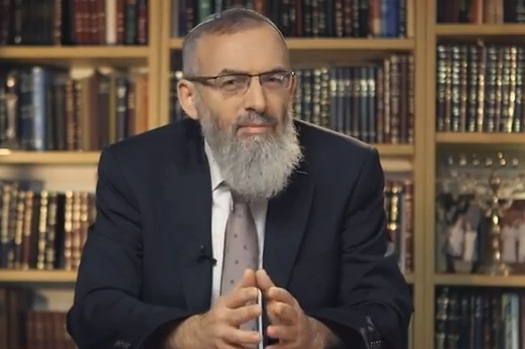
Candidate for Chief Rabbi: Chabad Shows Way to Unite Jews
On the eve of elections for the Israeli chief rabbinate, one of the more prominent candidates, Rabbi David Stav, told The Algemeiner that he believes he has what it takes to heal the growing rift in Israeli society between secular and orthodox Jews.
“I really believe that in this historic moment in Israel’s history we actually have two choices,” he declared, “We can tear Israeli society to pieces. There will be one Haredi (Ultra-Orthodox) piece, and the rest of the people, or we can make all efforts in order to insist on having ourselves as one united nation.”
Sharply criticized by the Ultra-Orthodox for what they describe as a liberal lean in how they say he would administer Jewish law as chief rabbi, Stav maintains that he brings a revolution that is more in style than in Halachic (Jewish legal) substance. “I believe that we, me and my friends, have the way to expose Israeli society to Jewish tradition and to Jewish heritage without causing anti-religious and other reactions that bring Israeli society to kind of a hatred of Jewish tradition,” Stav said, citing the work of his organization, Tzohar, that strives to provide “strictly Halachic” weddings while showing sensitivity to the “unique needs,” of couples and their families.
The rabbi points to the hugely successful Jewish outreach group, Chabad, as an example of how strong Jewish traditions can be maintained without alienating more liberal constituents. “I think that Tzohar and Chabad share a lot in common,” he says.
“Actually, one of my friends wrote an article last Friday saying that our dream is to make all local rabbinates and all local offices of the religious councils as kind of branches of Chabad, meaning we want to make these places into embracing places, people that will come there will feel welcome,” he said.
But, he insists, on the key issues that the rabbinate is tasked with administering, he will stay true to the letter of the law. “I believe that the (Lubavitcher) Rebbe’s demand that insisted on the acceptance of Torah and mitzvot as a condition for being a part of the Jewish nation, of converting, is accepted by me,” Stav said, adding, “there will be no change in the Halachic demands of the convert, no change whatsoever.”
Stav is popular in Israel among the modern Orthodox, and describes himself as coming from the “religious Zionist stream.” His opponents however claim that his willingness to embrace those with a lesser commitment to orthodox Judaism may lead to a bending of the strict Judaic laws on conversion, marriage and Jewish life that are maintained by the Jewish state’s chief rabbinate.
When the lines of politics and morality meet Stav says that he would be willing to speak out, even on controversial issues.
“I believe that the Chief Rabbi has to be involved as long as he feels that he serves a moral issue that relates to the Jewish existence in the State of Israel. If there is harm, damage, that is caused to certain people because of political issues, decisions, this should be something that concerns him,” he said.
But, Stav clarified: “Only when I’ll be sure that it’s something that nobody knows without me saying. For instance, the government decides to withdraw from Gaza. I’m deeply convinced that Halachically it’s forbidden. Now I have to ask myself whether my being involved will add to the discussion.”
Stav also sees the rabbinate’s relationship with diaspora Jewish communities as very important.
“I think that the chief rabbinate plays a very important role in the relationship between the Jews in the diaspora and the people that live here (Israel),” he confirmed, “because if the Chief Rabbinate will not show a face that is kind of embracing to the entire Jewish people all over the world, we’ll find ourselves in a situation whereby more and more rabbis in congregations, and people – it doesn’t matter whether they’re conservative, reform or orthodox – will say, ‘We don’t want to have any connection with the State of Israel because they insult us here and insult us there.’”
One issue that has attracted media attention, and prompted the involvement of American Jewish groups, is the Women of the Wall campaign for Israel to allow women to behave exactly as men while praying at the Western Wall. Stav believes he can find a solution that would be agreeable to both sides. “If there will be goodwill from all sides we’ll find a solution,” he pledged, citing the media attention earned by the various groups over the issue as an obstruction to amicable talks.
“I believe that the main problem there is the approach of the police to the Women of the Wall more than the approach of others to them, because I think many people took advantage of the fact that the police arrested women who were wearing tefillin and tzitzit. And you know, to see a policeman arrest a woman wearing tallis and tefillin seems very strange and, I would dare to say, even stupid. So I guess these are the issues that bother American society. I believe that it could be solved,” he explained further.
“We will be here as a listening ear that will try to help every Jew in every community all over the world with its Halachic problems, with its rabbinical problems or with any other kind of problems that people have,” Stav promised in his closing remarks. ”We want to become an address for the Jewish people.”
“For all the Jewish people?” asked The Algemeiner.
“All the Jewish people,” the rabbi affirmed.












